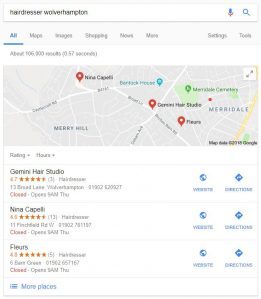
Naturally, every business that cares about their online presence wants to achieve excellent search visibility and build an awesome reputation on social media and review websites.
But did you know that online reviews can influence your SEO? It’s true! Carefully managing your public reviews and feedback can have a positive impact on your search rankings.
We’ve identified 5 ways that managing your brand’s online reputation can positively impact your search visibility – but first, let’s take a look at what online reputation management actually means.
What is Online Reputation Management? (“ORM”)
Online reputation management is all about being aware of the public conversations that people are having about your company online and managing your business profile by engaging with both praise and criticism for you via social media (Twitter, Facebook, etc.) and review channels (Yell, TripAdvisor, etc). The goal is for those seeking you out online to be met with an overall positive sentiment from those who have worked with you in the past.
Reviews and social comments from previous customers can play a crucial part in winning more business. 91% of consumers take action as a result of reading positive reviews online (Source: Critical Research, 2017); so the practice of getting involved with what people are saying about you can be incredibly valuable.
Wondering where to start with ORM? Check out our previous article 6 Essential Tips for Online Reputation Management.
5 Ways Online Reputation Management Can Help SEO
1. Listings Establish Your Presence
Search engines need to provide a good experience to their users to keep them coming back time and time again. As such, they tend to cross-reference company information with listings from across the web to make sure they’re giving out the right information. Therefore, it’s important to make sure your phone numbers, email addresses, map pointers, postal addresses, and opening times are correct and consistent across all of your online company listings.
2. User-Generated Content is Still Content!
Though individual reviews may not give quite the same boost as “established” content formats like blogging or video, growing your reviews through trusted sites like Yell and Trustpilot can benefit your SEO in a similar vein to the way content marketing does.
By building a profile of high-quality reviews, you gain a library of fresh, relevant, and genuine content associated with your business; from neutral, organic third parties; published on highly trustworthy review sites. Having this valuable content associated with your company gives search engines a good deal of contextual information about you, and more for the search crawlers to grab hold of.
3. Discover New Long-Tail Keywords
Hearing from your customers in their own words has its benefits. Take an in-depth look at the language that people use in their reviews – this may be a great source of keyword inspiration. Carrying out keyword research as an expert in your field is all well and good but familiarising yourself with the lingo your customers use when they’re referring to your products and services can be incredibly insightful and powerful. Reviews can provide a wealth of useful – but lesser used – long-tail keywords that you can incorporate into your website’s copy to assist with optimisation.
4. Tried & Tested Social Proof
Search engines tend to rank companies with good reviews higher than those with poor or non-existent ratings. For example, Google looks at reviews from its own Google My Business platform, and from trusted partners like Yell and Facebook, to establish the social standing of a company. Is the company demonstrably popular and well-liked? Or is there evidence to suggest that that the company provides a bad experience? Google looks at reviews and star ratings to make a judgement call about how suitable your company is for a searcher’s query.

5. Boosts your “Local 3-Pack” Presence
If you’ve ever searched for a company online, chances are that you’ve come across the “local 3-pack” – results shown with a small map, indicating the location and contact details of three suitable results. The SEO experts at Moz state that 13% of local 3-pack ranking factor comes from review signals such as the quantity and diversity of user-generated reviews. 13% may not sound like a lot, but it can easily tip the scales in your favour over a competitor – or vice versa!
If your company isn’t already registered with Google My Business, we highly suggest you do so to help give your brand a fighting chance of appearing in Google’s local 3-pack – and to give you another trusted avenue through which to receive reviews.
A Final Thought About Negative Reviews
If you’re totally new to online reputation management, opening yourself up to reviews can be a daunting prospect. But if you care deeply about the customer experience, you’re unlikely to receive anything too scathing! However, it’s worth remembering that negative reviews can present a great opportunity to improve and learn, allowing you to put measures in place so that bad experiences don’t happen again.
You have the power to nip any bad experiences in the bud before they reach the internet. Think about what you would ideally like to happen if a customer raises a complaint. Use this to craft a clear and defined method of escalating and resolving complaints – whether they’re received face-to-face or online. By having a plan of action for when criticism comes in, you’re more likely to resolve things amicably; but if you fly by the seat of your pants or leave staff to their own devices in the face of negative feedback, they may not make the best decisions for your brand. This is where truly bad experiences can run wild!
Want to know more about how to turn a customer’s frown upside down? Head over to our article Turning Negative Reviews into Positive Experiences.
But if you welcome reviews of all kinds, put effort into keeping an eye on reputation, and deal with customers’ opinions fairly and openly, you have nothing to worry about – and potentially more to gain!
[bctt tweet=”Wondering what #reputationmanagement has to do with #SEO? ” username=”yellbusiness”]
Reputation management is an important part of online PR, but it can be problematic when you’re juggling multiple review pages, listings, and social media platforms at once. Yell’s new reputation management product enables users to manage their online business listings, reviews and social media networks all through a single dashboard. Find out more here.





